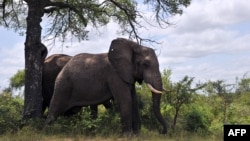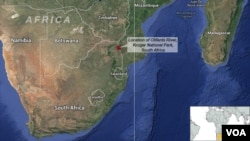JOHANNESBURG —
A key tributary for a major river in South Africa's Kruger National Park has been contaminated by a toxic spill from a fertilizer company. Officials with the National Parks Service say the spill has been stopped but contributed to a massive fish kill and could have ramifications for animals who drink from and live in the river.
On December 30, fishermen on the Selati River, near the western entrance to Kruger National Park, found large numbers of dead fish in the river.
Within hours, officials with the South Africa National Parks Service discovered that highly acidic water from Bosveld Phosphates, a fertilizer manufacturer run out of a former mine, had spilled into the river.
Storm water drains running through the operation's land were contaminated with water used in the fertilizer operation because of a pipe break.
The Selati is the last major tributary for the Olifants River, which is one of five major rivers running through Kruger.
Officials don't know the volume of contaminated water, but the spillage was going into the river for at least a week, and was finally stopped Tuesday.
Stefanie Freitag-Ronaldson, general manager of scientific services for the parks system, said the water was highly acidic, with a pH value well below the normal level of 7.
"The pH were incredibly low. It was very acidic water that moved into the system. In the immediate vicinity of the spillage there was very, very low pH's and that's where we got the biggest fish kill, obviously," she explained.
The parks service is using water reserves to supply clean water to tourist camps in the park.
As for the animals, rangers can't keep them all away from the Olifants River. Eddie Riddell, the manager for water resources in the park, notes that larger animals can drink from watering holes and streams filled up by recent rainfall.
"From the perspective of maintaining water supply to the larger animals in the terrestrial ecosystem, it's not an issue at the moment. If it was winter, in our dry winter period, then we'd have more of an issue to deal with," he said.
But Freitag-Ronaldson says that for animals who are dependent on or live in the river, the impact is yet unknown.
"Of course we are concerned about those animals that live in the river itself, such as hippos and crocodiles, and a whole host of small biota," she said. "We are also not sure when the effects of a pollution event of this nature will be manifested in those animals. So it's basically, at this point, a monitoring game."
She says birds who feed on the dead fish might be the first sign of possible effects on other animals.
The South African parks service is awaiting numbers on how much contaminated water leaked into the river, and is starting in-depth investigations on the long-term environmental impact of the spill.
On December 30, fishermen on the Selati River, near the western entrance to Kruger National Park, found large numbers of dead fish in the river.
Within hours, officials with the South Africa National Parks Service discovered that highly acidic water from Bosveld Phosphates, a fertilizer manufacturer run out of a former mine, had spilled into the river.
Storm water drains running through the operation's land were contaminated with water used in the fertilizer operation because of a pipe break.
The Selati is the last major tributary for the Olifants River, which is one of five major rivers running through Kruger.
Officials don't know the volume of contaminated water, but the spillage was going into the river for at least a week, and was finally stopped Tuesday.
Stefanie Freitag-Ronaldson, general manager of scientific services for the parks system, said the water was highly acidic, with a pH value well below the normal level of 7.
"The pH were incredibly low. It was very acidic water that moved into the system. In the immediate vicinity of the spillage there was very, very low pH's and that's where we got the biggest fish kill, obviously," she explained.
The parks service is using water reserves to supply clean water to tourist camps in the park.
As for the animals, rangers can't keep them all away from the Olifants River. Eddie Riddell, the manager for water resources in the park, notes that larger animals can drink from watering holes and streams filled up by recent rainfall.
"From the perspective of maintaining water supply to the larger animals in the terrestrial ecosystem, it's not an issue at the moment. If it was winter, in our dry winter period, then we'd have more of an issue to deal with," he said.
But Freitag-Ronaldson says that for animals who are dependent on or live in the river, the impact is yet unknown.
"Of course we are concerned about those animals that live in the river itself, such as hippos and crocodiles, and a whole host of small biota," she said. "We are also not sure when the effects of a pollution event of this nature will be manifested in those animals. So it's basically, at this point, a monitoring game."
She says birds who feed on the dead fish might be the first sign of possible effects on other animals.
The South African parks service is awaiting numbers on how much contaminated water leaked into the river, and is starting in-depth investigations on the long-term environmental impact of the spill.









